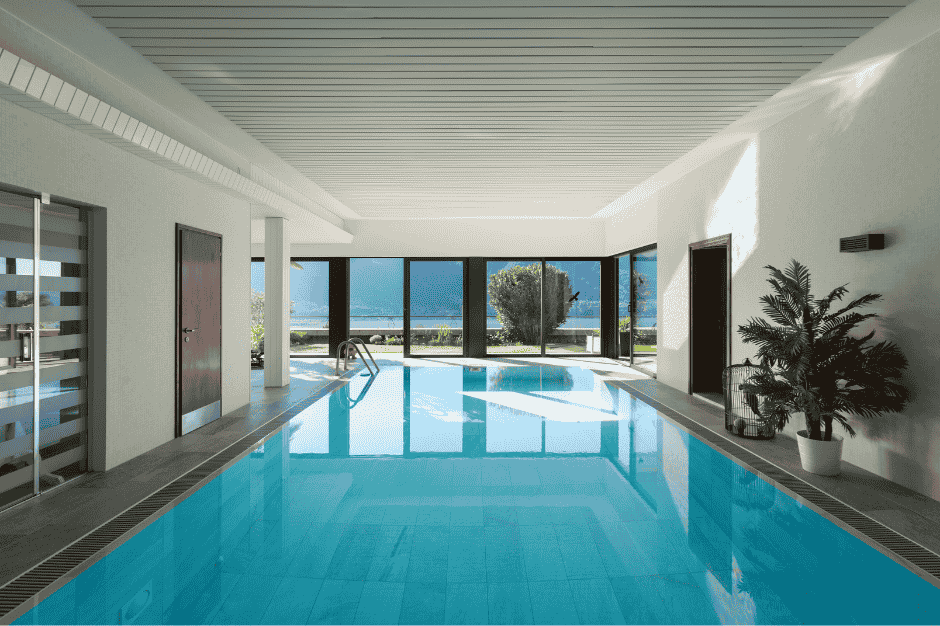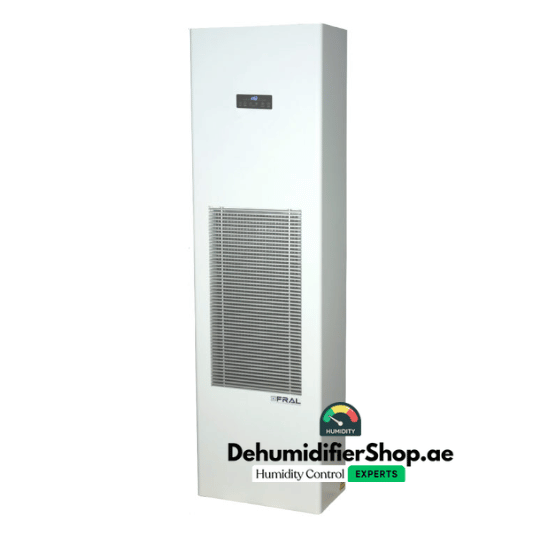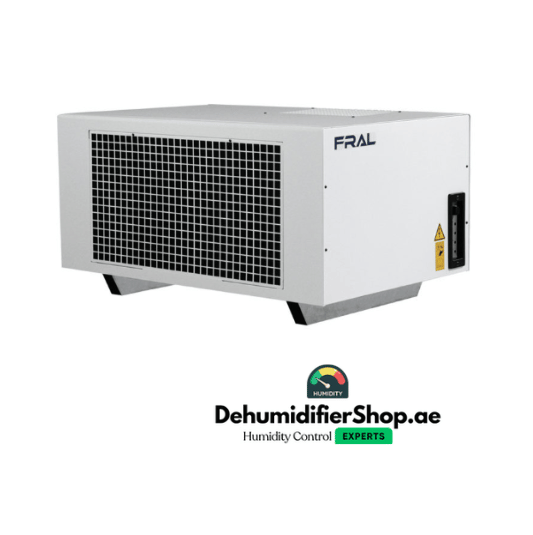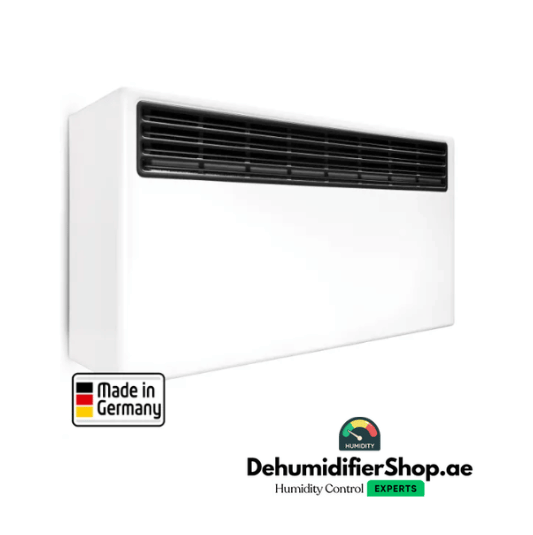
Diving into the joys of pool ownership brings endless summer fun, but it also comes with responsibilities that extend beyond just maintaining water quality. One often overlooked aspect is the air quality around your pool area, which can cause significant damage to your entire property as the humid air gets recirculated through your central AC system or infiltrates to other parts of your property. High humidity causes mold, musky odors, corrosion, bacteria and allergen development among many other issues.
This is where a swimming pool dehumidifier steps in as an essential companion for every pool owner. Not only does it help create a comfortable atmosphere, but it also protects your home and equipment from moisture damage and mold growth. In this ultimate guide, we will explore the myriad benefits of investing in a dehumidifier, discussing how it can enhance your swimming experience while safeguarding your health and property.
Say goodbye to dampness and hello to clean, fresh air—let’s dive in and discover why a dehumidifier is an indispensable asset for your pool sanctuary.
How Humidity Affects Your Swimming Pool and Surrounding Areas
Humidity is a common issue in indoor pool environments, and its effects can be far-reaching. High humidity levels can lead to condensation on surfaces such as windows, walls, and ceilings. This condensation can cause paint to peel, wallpaper to bubble, and metal fixtures to corrode. Over time, these seemingly minor issues can escalate into costly repairs and renovations.
Moreover, excessive humidity can compromise the structural integrity of your pool area. Moisture can seep into the building materials, leading to wood rot, mold growth, and even structural weakening. Mold and mildew thrive in damp conditions, and once they take hold, they can be difficult to eradicate. Not only do they cause damage to your property, but they also release spores into the air, which can trigger allergies and respiratory problems.
The pool water itself is also affected by high humidity. Chlorine, which is used to disinfect pool water, can evaporate more quickly in a humid environment, reducing its effectiveness and requiring more frequent chemical adjustments. Additionally, the evaporation of pool water can lead to increased humidity levels, creating a vicious cycle. Managing humidity is therefore essential for maintaining both the physical structure of your pool area and the quality of the pool water itself.
Common Issues encountered when not using a Swimming Pool Dehumidifier in UAE
High humidity in a home can lead to a variety of issues, affecting comfort, health, and the integrity of the property itself. Here’s a comprehensive list:
- Health & Comfort Issues:
- Discomfort: Air feels sticky, heavy, and warmer than it actually is, making hot weather feel even more oppressive.
- Allergy Flare-ups: High humidity provides an ideal breeding ground for dust mites, mold, and mildew, which are common allergens.
- Respiratory Problems: Can exacerbate conditions like asthma, bronchitis, and other respiratory illnesses due to increased mold spores and dust mites in the air.
- Skin Irritations: Can lead to clammy skin, heat rash, and make existing skin conditions worse.
- Sleep Disturbances: Uncomfortable, humid air can make it difficult to fall asleep and stay asleep.
- Unpleasant Odors: A persistent musty, damp smell often indicates mold or mildew growth.
- Damage to Property & Belongings:
- Mold and Mildew Growth: Visible fuzzy or slimy patches on walls, ceilings, carpets, furniture, clothes, and in bathrooms or basements. This is perhaps the most common and damaging issue.
- Wood Damage: Wooden furniture, floors, and structural elements can warp, rot, swell, or crack.
- Corrosion and Rust: Metal objects, tools, appliances, and electronics can corrode or rust prematurely.
- Peeling Paint and Wallpaper: Moisture can cause paint to bubble and peel, and wallpaper to lift away from walls.
- Damage to Fabrics and Upholstery: Clothes, curtains, carpets, and upholstered furniture can feel damp, develop mold, and get a musty smell.
- Condensation: Water droplets can form on windows, pipes, cold surfaces, and even inside walls, leading to water damage over time.
- Book and Document Damage: Paper products can absorb moisture, leading to warping, wrinkling, mold, and degradation.
- Pest Infestations: Humid environments are attractive to various pests, including cockroaches, silverfish, and spiders.
- Home Efficiency & Maintenance Issues:
- Increased Energy Bills: Your air conditioning system has to work harder to remove moisture from the air in addition to cooling it, leading to higher electricity consumption.
- Less Effective Cooling: Even if your AC is running, if humidity is high, the air will still feel warmer and less refreshing.
- Structural Damage: Long-term moisture issues can weaken wooden structures and foundations.
- Increased Maintenance: More frequent cleaning for mold and mildew, and potentially higher repair costs for damaged items.
Concerned about your indoor pool’s humidity? Contact Us for a FREE Pool Dehumidifier Consultation in Dubai & UAE!
The Role of Dehumidifiers in Maintaining Pool Air Quality
Dehumidifiers play a crucial role in controlling the humidity levels in your indoor pool area. By extracting excess moisture from the air, dehumidifiers help maintain a comfortable and healthy environment. This not only prevents the problems associated with high humidity but also enhances the overall experience of using your pool.
A dehumidifier works by drawing in moist air, cooling it to condense the moisture, and then reheating the air before releasing it back into the room. This process effectively reduces the humidity levels, preventing condensation and the associated issues. By maintaining optimal humidity levels, dehumidifiers help protect your property from moisture damage and mold growth, ensuring that your pool area remains in good condition.
In addition to protecting your property, dehumidifiers also contribute to better health and comfort. By reducing the humidity, they create a more pleasant environment for swimming and lounging. High humidity can make the air feel heavy and uncomfortable, leading to excessive sweating and difficulty breathing. A dehumidifier helps alleviate these issues, allowing you to enjoy your indoor pool to the fullest.
Signs Your Pool Needs a Swimming Pool Dehumidifier
Recognizing the signs that your pool area needs a dehumidifier is essential for preventing moisture-related problems. One of the most obvious signs is the presence of condensation on windows, walls, and other surfaces. If you notice water droplets forming on these surfaces, it indicates that the humidity levels are too high and need to be addressed.
Another sign to look out for is the musty smell often associated with mold and mildew. This odor is a clear indication that mold is present, which means that the humidity levels are high enough to support its growth. If you notice this smell, it’s important to take action immediately to prevent further mold development and the associated health risks.
Additionally, if you or others using the pool area experience respiratory problems, allergies, or frequent illness, it could be a sign that the air quality is poor due to high humidity. Excessive humidity can exacerbate respiratory conditions and trigger allergies, making it uncomfortable and unhealthy to spend time in the pool area. By recognizing these signs early, you can take the necessary steps to improve air quality and ensure a safe and comfortable environment.
If you see any of the problems in the section above in your home, you need a swimming pool dehumidifier.
Explore our range of Fral and Trotec pool dehumidifiers – View Pool Dehumidifier Products Here!
Types of Dehumidifiers for Pool Environments
There are several types of dehumidifiers available, each suited to different pool environments and needs. Understanding the various options can help you choose the right dehumidifier for your indoor pool area.
1. Floor Standing Dehumidifier for Swimming Pools

Portable dehumidifiers are a popular choice for smaller pool areas or for those who need a flexible solution. These units are easy to move and can be placed wherever they are needed most. They are typically less expensive than other types of dehumidifiers and can be a good option for temporary use or for those who are not ready to invest in a more permanent solution.
2. Ducted Dehumidifiers for Swimming Pools

Whole-house dehumidifiers are designed to be integrated into your home’s HVAC system. These units are capable of managing humidity levels throughout the entire house, including the pool area. While they are more expensive and require professional installation, they offer a comprehensive solution for controlling humidity and improving air quality in larger spaces.
3. Wall-mounted Swimming Pool Dehumidifiers

Pool-specific dehumidifiers are designed specifically for use in indoor pool environments. These units are built to handle the high humidity levels associated with indoor pools and are often more powerful and durable than other types of dehumidifiers. They can be installed as standalone units or integrated into the pool’s existing ventilation system, providing a tailored solution for maintaining optimal air quality.
Choosing the Right Swimming Pool Dehumidifier in Dubai
Select the right dehumidifier capacity:
When selecting a dehumidifier for your pool area, there are several key features to consider to ensure you choose the right unit for your needs. One of the most important factors is the capacity of the dehumidifier, which is typically measured in pints of water removed per day. The capacity you need will depend on the size of your pool area, pool room size, number of people in the room, infiltration with respect to the level of humidity you wish to achieve.
Chlorine Induced Rusting:
Most pools are added with chlorine to prevent bacteria, viruses and algae formation. However, when the water evaporates – it gets sucked into the return duct of your central AC. Then it starts corrosion in your expensive AHU, FCU and all places it gets recirculated. If you buy a normal dehumidifier, it will rust as well. You need to a buy a dehumidifier whose evaporator is coated with anti-corrosion substance achieved through cataphoretic process.
Energy Efficiency:
Energy efficiency is another important consideration. Some dehumidifiers can consume a significant amount of energy, so choosing an energy-efficient model can help reduce your operating costs. Look for units with energy-saving features such as programmable timers, adjustable humidity settings and auto-cutoff features.
Noise Level:
The noise level of the unit, especially if your pool area is attached to your living space. Quieter models can help ensure that the dehumidifier does not disrupt your enjoyment of the pool area. Selecting a dehumidifier below 70 dB(A) is often a good choice.
Our expert team provides tailored advice for indoor pool humidity control in Dubai, Contact us for FREE CONSULTATION !
Installation and Maintenance Tips for Dehumidifiers
Proper installation and maintenance of your dehumidifier are essential for ensuring its effectiveness and longevity. When installing a dehumidifier, it’s important to choose the right location. The unit should be placed in an area where it can effectively circulate air and remove moisture. Avoid placing the dehumidifier near sources of water or in areas where it may be exposed to splashing or excessive moisture.
Professional installation is recommended for whole-house and pool-specific dehumidifiers, as these units often require integration with your existing HVAC or ventilation system. A professional can ensure that the unit is installed correctly and operates efficiently, providing optimal humidity control for your pool area.
Regular maintenance is also crucial for keeping your dehumidifier in good working condition. This includes cleaning the filters, coils, and other components to prevent the buildup of dust and debris. Depending on the model, you may also need to empty the water collection tank or ensure that the drainage system is functioning properly. Regularly inspecting the unit for signs of wear or damage can help prevent issues before they become serious problems.
Cost Considerations: Is a Dehumidifier Worth the Investment?
Yes, investing in a swimming pool dehumidifier is worth the investment. Swimming pool cause massive amounts of evaporation and it can easily get recirculated to other areas damaging your property in ways that come to light very late.
Investing in a dehumidifier for your pool area can seem like a significant expense, but it’s important to consider the long-term benefits and potential cost savings. The initial cost of the unit and installation can vary widely depending on the type and capacity of the dehumidifier. Portable units are generally less expensive, while whole-house and pool-specific dehumidifiers can be more costly.
However, the cost of not addressing high humidity levels can be much higher. Moisture damage to your property, including structural issues, mold growth, and deterioration of finishes and fixtures, can result in costly repairs and renovations. Additionally, poor air quality can lead to health problems, which can result in medical expenses and decreased quality of life.
By investing in a dehumidifier, you can protect your property and health, potentially saving money in the long run. Moreover, energy-efficient models can help reduce operating costs, making the investment more manageable. When considering the cost, it’s important to weigh the benefits of improved air quality, comfort, and property protection against the initial expense.
Conclusion: Enhancing Your Pool Experience with Proper Air Quality Management
In conclusion, maintaining proper air quality in your indoor pool area is essential for creating a safe, comfortable, and enjoyable environment. High humidity levels can lead to a range of problems, including moisture damage, mold growth, and health issues. A dehumidifier is an invaluable tool for controlling humidity and protecting your property and health.
By understanding the importance of air quality, recognizing the signs that your pool needs a dehumidifier, and choosing the right unit for your needs, you can effectively manage humidity levels and enhance your pool experience. Proper installation and maintenance are key to ensuring the longevity and effectiveness of your dehumidifier, and the investment is well worth the benefits of improved air quality, comfort, and property protection.
With the right dehumidifier, you can say goodbye to dampness and hello to clean, fresh air in your indoor pool area. Enjoy the peace of mind that comes with knowing your pool environment is well-maintained and your health and property are protected. Dive into a better pool experience with the ultimate guide to maintaining your swimming pool’s air quality.
Don’t let humidity ruin your indoor pool experience. As leading pool dehumidifier suppliers in UAE, Sencoline Trading LLC offers expert advice and the best solutions from Trotec, Fral, and Dantherm. Get Your Personalized Pool Dehumidifier Quote Today!
